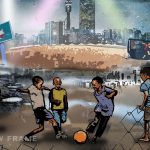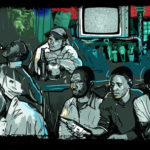Icasa: Can the SABC cope with a bigger sports load?
The public broadcaster is already struggling financially to air the sports events in its current mandate. If Icasa’s proposed broadcasting regulations are passed, the number of events will rise dra…
Author:
1 August 2019

Millions of South Africans who rely on the South African Broadcasting Corporation (SABC) to watch sport face a blackout of South African football from Saturday 3 August, unless the public broadcaster reaches a last-minute agreement with the Premier Soccer League (PSL).
A cloud of uncertainty hovers over the SABC’s broadcast of Mamelodi Sundowns’ clash with SuperSport United at Lucas Moripe Stadium on Saturday, along with the other matches in the opening round of the Absa Premiership this weekend. The SABC and the PSL have been involved in negotiations over the public broadcaster’s rights to air domestic football. The situation is allegedly so tense that the SABC has been instructed not to use footage from last season’s PSL matches because of the impasse.
The start of the 2018-2019 season – the last campaign before the start of the new five-year broadcasting rights cycle for which major satellite service MultiChoice paid more than R2 billion – was marred by SABC radio’s blackout of domestic football in the early rounds. The PSL accused the SABC of not meeting certain obligations in their previous contractual agreement.
The government had to step in to solve the crisis that led to millions of South Africans being unable to listen to football commentary, while SABC radio journalists were barred from entering stadiums before the matter was resolved.
PSL acting chief executive Mato Madlala went so far as to write a letter to clubs, ordering them to “please ensure that no SABC radio personnel are permitted access to any matches and/or allowed to cover matches until such time as the league receives confirmation from the SABC that they will meet their obligations under the agreement”.
Between a rock and a hard place
The SABC didn’t want to comment on whether or not they will air the opening round of matches. Spokesperson Vuyo Mthembu failed to respond to numerous emails after promising to respond once she had received answers from SABC Sport. SABC 1’s schedule at the time of publishing did not show the SABC airing the Tshwane derby on Saturday or Highlands Park’s clash with Kaizer Chiefs on Sunday 4 August. The schedule said “content to be confirmed” at the times these matches are scheduled to be played.
The uncertainty over the airing of the opening round of football matches casts further doubt over the public broadcaster’s ability to meet the mandate that the Independent Communications Authority of South Africa (Icasa) plans to entrust it with, in terms of Icasa’s proposed sports broadcasting rights regulations that seek to ensure more events of “national interest” are aired on free-to-air television. At the moment, most major sporting events are aired on pay television, with the SABC – and the majority of the country – fed the sporting scraps.
Related article:
The SABC finds itself between a rock and a hard place. Icasa’s proposed regulations and the SABC’s mandate as the public broadcaster push it to air sports events of national interest. But its financial woes make it difficult for the SABC to honour this obligation.
Icasa plans to redefine which sports events fall into the category of national interest by widening the scope to include all PSL matches, Currie Cup, Super Rugby, CAF Champions League, CAF Confederation Cup, domestic cricket, Cosafa Cup matches, Africa Cup of Nations (Afcon), the Olympics, International Association of Athletics Federation meets, World Cups in the major sporting codes and netball matches, among other events.
This year alone, the SABC failed to comprehensively broadcast the ICC Cricket World Cup, the Fifa Women’s World Cup and the Fifa Under-20 World Cup.
“We are mandated, in terms of our regulations, to carry 22 sporting codes as stipulated in the [previous] Icasa regulations. But there is no explanation of where the SABC should find the commercial windfall to fund this R1.2 billion,” former SABC chief operations officer Chris Maroleng said. The SABC has to pay this amount for broadcast rights over a three-year period.
Related article:
SABC head of policy and regulatory affairs Philly Moilwa, speaking at the Icasa hearing on sport broadcasting regulations between 27 and 31 May at the African Pride Irene Country Lodge in Centurion, said the increase in the cost of sports broadcasting rights is detrimental to its business model.
“The audiences are declining but the prices [for Bafana Bafana rights] are going to the north. Every year the price increases but the audience declines,” Moilwa said.
The impact of SABC’s financial woes
The SABC has yet to resolve its impasse with the South African Football Association (Safa), which led to the broadcasting blackout of the 6-0 thumping of the Seychelles and the 1-1 draw with Nigeria at FNB Stadium in the qualifiers for the 2019 Afcon. The SABC’s financial woes led to it offering Safa R10 million to extend their contract while Safa wanted at least R110 million, which the SABC had paid for their previous agreement.
SABC chief executive Madoda Mxakwe echoed Moilwa’s sentiments when he said, “The valuation of sports rights by the rights holders bear no relation to their commercial value for the free-to-air broadcaster. The imbalance continues to undermine the primary goal of the regulations, which is free access for all South Africans.”
In the past financial year, the SABC spent R550 million on broadcast rights and covering sports events. Revenue generated from these events for the same period was a mere R143 million. This represents “a negative return on investment of 74%.”
Mxakwe said “the unbundling of the rights may be one mechanism to deal with the issue … It is unfair for the dominant players to acquire the rights of all platforms and then sublicense them to other players without any regulatory criterion.”
Related article:
Moilwa put this into perspective when he said, “We currently have a situation where you are a television broadcaster but you acquire rights for radio. What is the point? What are we doing as South Africans? If unbundling of the rights could mean that you also buy the rights that are relevant for your platform [then that could help us].”
This problem doesn’t only affect SABC’s football coverage, it also affects that of rugby and cricket.
“SABC, which is the big radio broadcaster, has to go and sublicense the rights from another broadcaster [MultiChoice] which is not even a radio broadcaster. It just doesn’t make sense!”
To aid the capacity of the national broadcaster, “the SABC … called on Icasa as a policymaker – to develop a framework that makes public funding of national sporting events to be mandatory by government”, added Mxakwe.
Regulating sublicensing
The reason Mxakwe said that unbundling is the solution to some of the SABC’s woes is because there was no “fairness and transparency in the process of acquiring, as well as sublicensing of sports rights” and that this needed to be addressed.
“The SABC has been exploited. We pay for what we do not know, we do not know the criterion,” said Moilwa.
Because the SABC cannot outbid MultiChoice in buying sports rights, it sublicenses most of its broadcasting rights. The public broadcaster said it is not privy to the original price of sports rights, so it doesn’t know if the sublicensed rights sold to them by pay television stations are overpriced.
“The SABC is continuously facing exorbitant price offerings on all sporting events, which compromises its financial systems, our credibility as a public broadcaster, as well as our ability to deliver on our public mandate,” said Mxakwe.
For Mxakwe, “the acquisition and sublicensing of sports rights requires a proper and all-inclusive review … to ensure that there is transparency and that the SABC, as a public broadcaster, is not exploited in the process.”
Moilwa told the hearing that the quality of the matches allocated to the SABC has contributed to the decline in audience numbers. The SABC complained of being given smaller teams to broadcast on their platform while high-profile matches are shown exclusively by MultiChoice. The corporation said that this has an impact on the audiences the two broadcasters attract.
For the SABC to meet its current broadcasting mandate, as well as air the proposed additional sports events should the Icasa regulations be passed, it would need a financial injection from the government.
The Treasury recently announced that the Department of Communications and the SABC failed to meet the preconditions for the public broadcaster’s more than R3 billion bailout. Without financial support, the SABC will struggle to compete for sports rights and most of the public, especially the poor, will see less and less live sport until the current abnormal status quo is the new normal.
This is the final piece of a three-part series on the proposed Icasa broadcasting regulations amendments.



